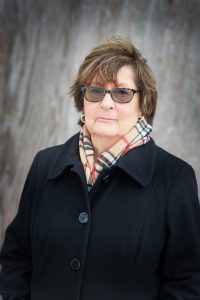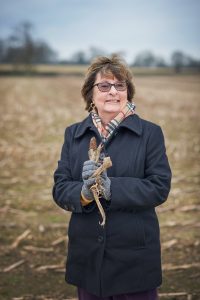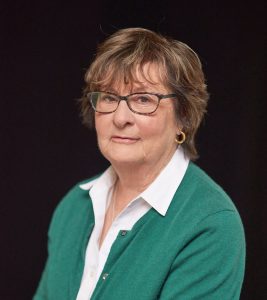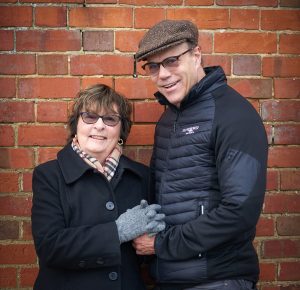Profile
By James Portman
Photos by Scarlet Page
Maureen Jennings delights at her literary success
It seems entirely characteristic of Maureen Jennings that her chosen interview venue should be an old bank vault.
 To be sure, it is now part of a Starbucks — but in this case, an unusual one. Once, when Toronto was, young, it was a bank — the old-fashioned kind with a stately but gracious interior and even a chandelier. We are back in another century here, the early part of that century — and this delights Jennings because the past is what informs her writing, especially her best-selling cycle of crime novels featuring Toronto detective William Murdoch. His dogged sleuthing at the dawning of the 20th Century has won him international popularity and has also kept the popular Murdoch Mysteries television series alive for 13 seasons.
To be sure, it is now part of a Starbucks — but in this case, an unusual one. Once, when Toronto was, young, it was a bank — the old-fashioned kind with a stately but gracious interior and even a chandelier. We are back in another century here, the early part of that century — and this delights Jennings because the past is what informs her writing, especially her best-selling cycle of crime novels featuring Toronto detective William Murdoch. His dogged sleuthing at the dawning of the 20th Century has won him international popularity and has also kept the popular Murdoch Mysteries television series alive for 13 seasons.
Jennings, who recently turned 80, has cycled over from her home to chat about a literary success story that continues to astonish her. And it is immediately clear that she is in a comfort zone in a Starbucks (before social distancing restrictions) that occupies its own unexpected time warp. We have retreated to the privacy of the old bank’s atmospheric vault for our interview, and a tape recorder seems terribly out of place in such surroundings.
“I love old places,” Maureen says as she settles down with a sandwich. Indeed, she is a living encyclopedia on such matters. Within the opening 10 pages of her debut novel, Except the Dying, published in 1997,you get a tapestry of Toronto as it was in 1895. It’s the attention to detail that brings it all to life — the way a servant girl would be expected to dress, details of Toronto’s drinking hours, the look of a fashionable Victorian carriage, the workings of a portable oil heater. However, Jennings also portrays a society in which fault lines are showing; the canker of prostitution, the plight of the poor, smouldering religious tensions.
Maureen smilingly admits she has a magpie mind when it comes to the past. “Something will just jump at me, and that’s sort of what I’m looking for, ”she says. “I love revisiting the old places, although some are long gone. But our old City Hall is still here, and I can go there and imagine what it would have been like all those years ago.”
 However, her concern for solid characterization in her books remains paramount. She knows that the success of the Murdoch thrillers is ultimately due to one factor: William Murdoch is a believable human being who endears himself to readers. It is a quality also present in Yannick Bisson’s performance in the long-running television series.
However, her concern for solid characterization in her books remains paramount. She knows that the success of the Murdoch thrillers is ultimately due to one factor: William Murdoch is a believable human being who endears himself to readers. It is a quality also present in Yannick Bisson’s performance in the long-running television series.
As the man who would become William Murdoch began taking shape in her imagination more than two decades ago, she stumbled on a strange photograph. It was not anyone she initially recognized. “But there was something about the face that struck me as very intelligent and very sensitive. And I thought — that’s my Murdoch! I wanted a man I could live with — who was believable and smart.”
Maureen also wanted a police detective with a strong moral compass. As for Murdoch’s Roman Catholicism: “I did that on purpose because I wanted that outsider thing in a Protestant-dominated Toronto. “Another thing I did with him when I first created him was to make him very lonely, a solitary. It is part of his character. He’s still carrying psychological wounds from his past. His father was abusive — and that’s sitting there, inside him. And sometimes he loses his temper.”
The Murdoch novels published in Canada by McClelland and Stewart remain steady sellers — they are also available in several other languages including, Polish, Korean and Czech — and the television series continues to flourish. But Maureen’s output extends beyond the world of Murdoch. She recently embarked on a new mystery trilogy set in Toronto in the aftermath of the First World War and featuring an intrepid private investigator named Charlotte Frayne. The first novel, Heat Wave, was published last year by Cormorant Books, and its successor, November Rain, is due to arrive this month.
Maureen’s fascination with the past has also prompted her to write a series of novels set in rural Britain during the Second World War, featuring a dogged British policeman named Tom Tyler. With these volumes, she was returning to her own childhood. She was also coming to terms with events that have helped define her own life and career.
 “Looking back, I think a lot of my early life was shaped by the aftermath of war,” she says. “As I got older, I felt the impact a lot. It was so difficult for men returning, and difficult for the women too, because of the years without their man. And then the man comes home, and the children don’t know their fathers. That had an effect. For some women, it was hard — they had to go back to being housewives after working out of the house, often for the war effort.”
“Looking back, I think a lot of my early life was shaped by the aftermath of war,” she says. “As I got older, I felt the impact a lot. It was so difficult for men returning, and difficult for the women too, because of the years without their man. And then the man comes home, and the children don’t know their fathers. That had an effect. For some women, it was hard — they had to go back to being housewives after working out of the house, often for the war effort.”
Maureen’s own father, a carpenter before the war, would not be coming home.
“My father was killed in the war, so I didn’t see him returning. But I did see the impact on my mother.”
Yet, she remembers a “good ”childhood.
“It was typical of the time and of our social position — which meant nobody would lavish praise on you in case you got pig-headed. My
mother worked as a cook and would continue to do so. We had enough money because of my father’s pension, so we weren’t in any sense ‘poor’ in the sense that we understood it. We might run out of coal, but that was not being poor — we just didn’t have a lot of money. Poor was across the tracks where the kids didn’t have underwear or socks. That was poor. My mother was a very good manager. We had enough money but no luxuries.”
Maureen grew up in a house without books, but that didn’t deter her.
“I loved school, and when I went to grammar school at the age of 11,it became a second home. I was reading like crazy — taking the maximum number of books out of the library.”
She yearned for the day that she would turn 14 and be able to borrow from the library’s adult section. Then the magic day arrived, and the future crime writer made some new discoveries: “OH, all those books! That’s when I met Sherlock Holmes.”
Maureen Jennings was 17 when she emigrated to Canada with her mother in 1956. Her mother’s older sister was living in Windsor, so that is where the new arrivals ended up. The border city was economically depressed at the time, but Maureen’s mother was able to find work because of her cooking skills.
As the years passed, Maureen was able to indulge her continuing thirst for learning, studying philosophy and psychology at the University of Windsor and earning a master’s degree in English literature at the University of Toronto.
 She joined the faculty of Ryerson Tech, teaching English for seven years, and then set up a private practice as a psychotherapist. A burning desire to write still lurked, but other issues kept intervening.
She joined the faculty of Ryerson Tech, teaching English for seven years, and then set up a private practice as a psychotherapist. A burning desire to write still lurked, but other issues kept intervening.
“I became very interested in feminism and decided to get together a group of women who would discuss feminist issues, which at the time were emerging — how to deal with sexual harassment and so on. This was at a time when major feminists like Gloria Steinem were starting to be heard.”
During one weekend get-together, Maureen discovered that some women were yielding to their creative impulses. One showed her a
painting she had done because of their discussion groups. Another had written a poem. Maureen’s response was to help the women form specialty groups that would encourage various creative gifts. And in a very real sense, this was an impetus to the launching of her own
writing career.
“I kept thinking; here I am trying to help all these people — now both men and women — find their creative voices, and I’m not really doing anything myself. That’s how it all started.”
She tried her hand at poetry and short stories, one of which received an honourable mention in the Toronto Star’s short story contest. She produced two unpublished novels that she says were terrible, but did find a publisher for her non-fiction book, Map of The Mind.
In the early 1990s, she had the chance to write two period plays with a mystery background for Toronto’s Solar Stage. The excitement of seeing her words come to life in a performance led to another life-changing decision. She decided to write a novel — not one set in contemporary times — but in Toronto as the 19th Century was drawing to its close.
The result was her first novel, Except the Dying, which begins with the discovery of the nude body of a servant girl outdoors on a bitter winter’s night and goes on to explore the seamy underside of the Toronto society of the day. It led to enthusiastic reviews and good sales.
Except the Dying and the next two Murdoch novels were filmed for television, proving so successful that a new 13-episode Murdoch
series was ordered, with Maureen as creative consultant.
“I thought — okay, maybe it can go for one season. Then wow — they want another season. Wow! And then another one — oh, my god. And
now it’s going into its 13th.”
The series was originally carried on City TV, and at one point, City decided to discontinue it —“apparently they wanted an American reality show in that slot,” Maureen says — leaving Murdoch’s television life in jeopardy. But then he was picked up by CBC, where he has moved from strength to strength.
“I see all the scripts, which are original, and we discuss them,” Maureen says. She also personally writes a script each season. “They just handed me an outline last week.”
Lately, the Murdoch of the printed page has advanced into new territory. Maureen had thought she was done with him as a character in her fiction: because the TV series with Yannick Bisson had assumed its own distinctive identity, she felt it was time to retire Murdoch from print. So, she began writing the Tom Tyler novels and a pair of contemporary thrillers set in Scotland’s Outer Hebrides, featuring forensic
profiler Christine Morris.
But then she was driven to revisit Murdoch in a later period of his life, and this coincided with her need to write about the First World War and its lingering aftermath. So, after a decade of silence, Maureen brought him back — older, sadder, and wiser — in her 2017 novel, Let Darkness Bury the Dead. It transported the reader back a century to 1917 and plunged Murdoch into a grisly murder investigation with dismaying connections to the war in Europe and possibly to his own grown son, Jack.
The result was an unusually dark and sombre entry in the Murdoch canon, and it is now Maureen’s favourite among the eight books chronicling his exploits. It was also the most emotionally draining book she had ever written because she kept thinking back to a later war and painful childhood memories. “I was writing about young men dying by the thousands. Yet, I realized I couldn’t have written any other kind of book.”
The spectre of war, both past and future, also hovers over, Heat Wave, the 2019 novel set in depression-era Toronto in 1936.The focal point of the narrative is the fictional Paradise Cafe, which is operated by a quartet of former prisoners of war, all of whom in various ways are still coping with past horrors. The novel also introduces a new Maureen Jennings sleuth in the person of Charlotte Frayne, a keen young private investigator whose first big case has to do with a mysterious thief who has been stealing from the cafe. But she is soon caught up in a
wider net involving the arrest of her employer for assaulting his wife and an outbreak of social unrest, Nazi fear mongering and outbreaks of anti-Semitism in a Toronto festering under a terrible heat wave.
Even with her historical thrillers, Maureen is writing about society. As a former academic grounded in philosophical issues, she is fascinated by the contradictions of human behaviour and is nagged by one persistent question: does the end ever justify the means? She cites as major influences the legendary Swedish crime-writing team of Maj Sjowall and Per Wahloo.“With them, it was the first time I ever heard it articulated that we could use the vehicle of the mystery to talk about social issues.”
Those concerns will also drive her next Paradise Cafe novel, November Rain. “I also like writing about the weather,” she confides with a smile.
She figures she is fairly disciplined in her profession. She gets up, breakfasts with her husband, photographer Iden Ford, walks the dog — and gets to work.
Maureen and her husband have been together for 40 years. “We had worked in the same building and had known each other casually. Then one day, by chance, I gave him a ride to a weekend retreat we were both attending. Stuck in a car for almost an hour, we discovered we had a lot in common. So, we went on a proper date, and there you have it.”
The name of the dog, by the way, is Murdoch. “He’s a labradoodle. He’s lovely.”






